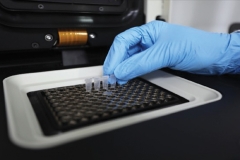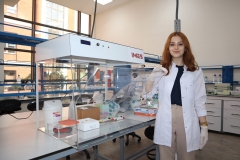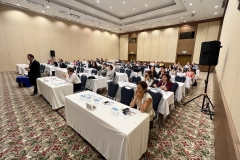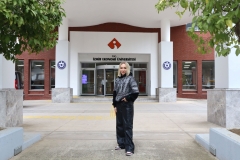
FACULTY OF ENGINEERING
Department of Biomedical Engineering
BME 302 | Course Introduction and Application Information
| Course Name |
Current Topics in Biomedical Engineering
|
|
Code
|
Semester
|
Theory
(hour/week) |
Application/Lab
(hour/week) |
Local Credits
|
ECTS
|
|
BME 302
|
Fall/Spring
|
3
|
0
|
3
|
5
|
| Prerequisites |
None
|
|||||
| Course Language |
English
|
|||||
| Course Type |
Elective
|
|||||
| Course Level |
First Cycle
|
|||||
| Mode of Delivery | - | |||||
| Teaching Methods and Techniques of the Course | - | |||||
| Course Coordinator | ||||||
| Course Lecturer(s) | ||||||
| Assistant(s) | - | |||||
| Course Objectives | The objective of this course is to introduce the up-to-date healthcare approaches, including personalized healthcare, nanomedicine, stemcell tratment, genetical tests as well as ethical paradoxes and dilemmas. |
| Learning Outcomes |
The students who succeeded in this course;
|
| Course Description | Tissue engineering, bio- and nano-materials, prosthetics, biomechanics, genetics, clinical trials, ethics |
|
|
Core Courses | |
| Major Area Courses |
X
|
|
| Supportive Courses | ||
| Media and Management Skills Courses | ||
| Transferable Skill Courses |
WEEKLY SUBJECTS AND RELATED PREPARATION STUDIES
| Week | Subjects | Related Preparation |
| 1 | Biomedical Engineering: A Historical Perspective | Chp 1, Introduction to biomedical engineering, Academic Press, 2012. |
| 2 | Biosignal Processing- intro | Chp 1, Biomedical signal and image processing, Taylor & Francis, 2012. |
| 3 | Biosignal Processing- EEG | Chp 10, Biomedical signal and image processing, Taylor & Francis, 2012. |
| 4 | Biosignal Processing- ECG | Chp 9, Biomedical signal and image processing, Taylor & Francis, 2012. |
| 5 | Medical image processing I | Chp 3&4, Biomedical signal and image processing, Taylor & Francis, 2012. |
| 6 | Medical image processing II | Chp 3&4, Biomedical signal and image processing, Taylor & Francis, 2012. |
| 7 | Midterm exam | |
| 8 | Medical İmage processing III | Chp 3&4, Biomedical signal and image processing, Taylor & Francis, 2012. |
| 9 | Biomedical Optics and Lasers I | Chp 17, Introduction to biomedical engineering, Academic Press, 2012. |
| 10 | Biomedical Optics and Lasers II | Chp 17, Introduction to biomedical engineering, Academic Press, 2012. |
| 11 | Artificial intelligence in biomedical engineering I | Lecture Notes |
| 12 | Artificial intelligence in biomedical engineering II | Lecture Notes |
| 13 | Artificial intelligence in biomedical engineering III | Lecture Notes |
| 14 | Moral and Ethical Issues I | Chp 2, Introduction to biomedical engineering, Academic Press, 2012. |
| 15 | Moral and Ethical Issues II | Chp 2, Introduction to biomedical engineering, Academic Press, 2012. |
| 16 | Final Exam |
| Course Notes/Textbooks | Frontiers in Biomedical Engineering: Proceedings of the World Congress for Chinese Biomedical Engineers,Springer, 2003. John D. Enderle and Joseph D. Bronzino, Introduction to biomedical engineering, Academic Press, 2012. Course slides. |
| Suggested Readings/Materials |
EVALUATION SYSTEM
| Semester Activities | Number | Weigthing |
| Participation | ||
| Laboratory / Application | ||
| Field Work | ||
| Quizzes / Studio Critiques | ||
| Portfolio | ||
| Homework / Assignments |
1
|
15
|
| Presentation / Jury |
1
|
15
|
| Project | ||
| Seminar / Workshop | ||
| Oral Exams | ||
| Midterm |
1
|
30
|
| Final Exam |
1
|
40
|
| Total |
| Weighting of Semester Activities on the Final Grade |
3
|
60
|
| Weighting of End-of-Semester Activities on the Final Grade |
1
|
40
|
| Total |
ECTS / WORKLOAD TABLE
| Semester Activities | Number | Duration (Hours) | Workload |
|---|---|---|---|
| Theoretical Course Hours (Including exam week: 16 x total hours) |
16
|
3
|
48
|
| Laboratory / Application Hours (Including exam week: '.16.' x total hours) |
16
|
0
|
|
| Study Hours Out of Class |
16
|
3
|
48
|
| Field Work |
0
|
||
| Quizzes / Studio Critiques |
0
|
||
| Portfolio |
0
|
||
| Homework / Assignments |
1
|
8
|
8
|
| Presentation / Jury |
1
|
8
|
8
|
| Project |
0
|
||
| Seminar / Workshop |
0
|
||
| Oral Exam |
0
|
||
| Midterms |
1
|
18
|
18
|
| Final Exam |
1
|
20
|
20
|
| Total |
150
|
COURSE LEARNING OUTCOMES AND PROGRAM QUALIFICATIONS RELATIONSHIP
|
#
|
Program Competencies/Outcomes |
* Contribution Level
|
||||
|
1
|
2
|
3
|
4
|
5
|
||
| 1 | To have adequate knowledge in Mathematics, Science and Biomedical Engineering; to be able to use theoretical and applied information in these areas on complex engineering problems. |
|||||
| 2 | To be able to identify, define, formulate, and solve complex Biomedical Engineering problems; to be able to select and apply proper analysis and modeling methods for this purpose. |
X | ||||
| 3 | To be able to design a complex system, process, device or product under realistic constraints and conditions, in such a way as to meet the requirements; to be able to apply modern design methods for this purpose. |
|||||
| 4 | To be able to devise, select, and use modern techniques and tools needed for analysis and solution of complex problems in Biomedical Engineering applications. |
|||||
| 5 | To be able to design and conduct experiments, gather data, analyze and interpret results for investigating complex engineering problems or Biomedical Engineering research topics. |
X | ||||
| 6 | To be able to work efficiently in Biomedical Engineering disciplinary and multi-disciplinary teams; to be able to work individually. |
X | ||||
| 7 | To be able to communicate effectively in Turkish, both orally and in writing; to be able to author and comprehend written reports, to be able to prepare design and implementation reports, to present effectively, to be able to give and receive clear and comprehensible instructions. |
|||||
| 8 | To have knowledge about global and social impact of Biomedical Engineering practices on health, environment, and safety; to have knowledge about contemporary issues as they pertain to engineering; to be aware of the legal ramifications of engineering solutions. |
|||||
| 9 | To be aware of ethical behavior, professional and ethical responsibility; to have knowledge about standards utilized in engineering applications. |
|||||
| 10 | To have knowledge about industrial practices such as project management, risk management, and change management; to have awareness of entrepreneurship and innovation; to have knowledge about sustainable development. |
|||||
| 11 | To be able to collect data in the area of Biomedical Engineering, and to be able to communicate with colleagues in a foreign language. |
|||||
| 12 | To be able to speak a second foreign language at a medium level of fluency efficiently. |
|||||
| 13 | To recognize the need for lifelong learning; to be able to access information, to be able to stay current with developments in science and technology; to be able to relate the knowledge accumulated throughout the human history to Biomedical Engineering. |
|||||
*1 Lowest, 2 Low, 3 Average, 4 High, 5 Highest
NEWS |ALL NEWS

Biomedical Engineering Erasmus Agreement was signed with Universidad Jaume University, Spain
The signing process for the agreement with Universidad Jaume for Biomedical Engineering has been completed. Our students can add this university to

OCCUPATIONAL HEALTH AND SAFETY TRAINING
Within the scope of BME 318 course, an Occupational Health and Safety Seminar was given to Biomedical Engineering students by our University's

An Oligonucleotide Story by Assoc. Prof. Dr. Osman DOLUCA
Within the scope of the Biomedical symposium organized by İzmir Katip Çelebi University Biomedical Society, our department chair, Assoc. Prof. Dr. Osman

Projects were entitled to receive support within the scope of the TÜBİTAK 2209-A
We congratulate our students and wish them continued success.

Important breakthrough in virus detection
Assoc. Prof. Dr. Osman Doluca, Acting Head of Department of Biomedical Engineering, Izmir University of Economics (IUE), reported that they have developed

'Smart cabinet' against the virus
Assoc. Prof. Dr. Osman Doluca and his 4 students from Izmir University of Economics (IUE) developed a 'PCR cabinet' that allows samples




